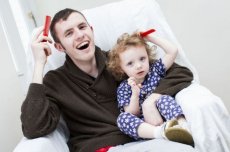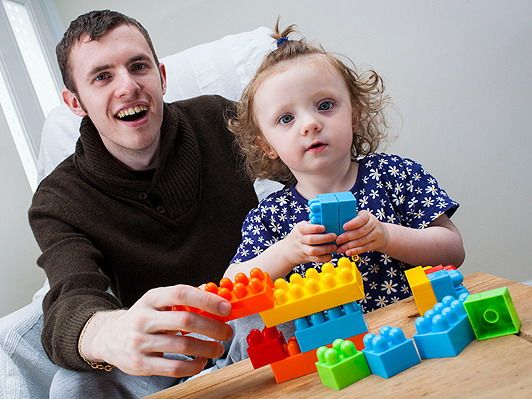New publications
A young daughter saved her father from paralysis.
Last reviewed: 01.07.2025

All iLive content is medically reviewed or fact checked to ensure as much factual accuracy as possible.
We have strict sourcing guidelines and only link to reputable media sites, academic research institutions and, whenever possible, medically peer reviewed studies. Note that the numbers in parentheses ([1], [2], etc.) are clickable links to these studies.
If you feel that any of our content is inaccurate, out-of-date, or otherwise questionable, please select it and press Ctrl + Enter.

A patient trapped in his own body was able to speak and walk again, copying the movements and speech of his little daughter. This story may provide the key to creating new methods of rehabilitation for such patients.
At the age of 22, Englishman Mark Ellis suffered a massive stroke, after which his entire body was paralyzed. Only Mark's brain remained clear and fully functional, the young man understood perfectly what was happening around him, but he could not say or do anything. Such patients are often called victims of locked-in syndrome, and they communicate with the world only through blinking.
The stroke occurred just weeks before Mark's 32-year-old wife Amy gave birth to their daughter Lily-Rose. But now the young father could only communicate with the child through eye movements. Doctors placed him in an induced coma, telling Mark's family that the chances of rehabilitation were slim. And yet, the patient managed to regain his health.

After only eight months, he left the hospital and went home on his own two feet. Lily-Rose played a decisive role in this amazing rehabilitation. As soon as Mark began to move weakly and make inarticulate sounds thanks to the efforts of physiotherapists and speech specialists, doctors decided that he would be able to learn speech and movement together with his daughter, who also could not do this due to her age.
The patient repeated all the sounds the child made. When she began to form the first words, Mark began to do the same. Almost simultaneously with his daughter, he was able to pronounce "mama" and "I want." The progress in terms of movements was exactly the same. Father and daughter soon began to play together, and this also gave Mark a powerful impetus for recovery.
"The fact that he was able to recover so quickly to the point of walking and talking independently is, of course, admirable," says Dr Sirvas Chennu, a neurologist at the University of Cambridge. "Some patients who have such a massive stroke manage to regain some movement years later, but they remain wheelchair-bound for the rest of their lives. This is an incredibly rare case that rehabilitation specialists need to study."
